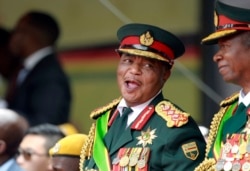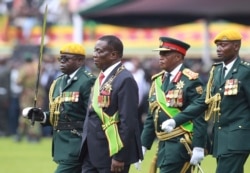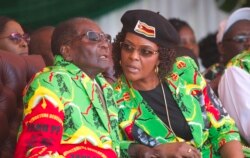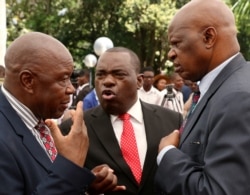The European Union (EU) has decided to renew its arms embargo and to maintain a targeted assets freeze against one company, Zimbabwe Defence Industries, for one year, taking into account the situation in Zimbabwe, including the yet to be investigated alleged role of the armed and security forces in human rights abuses.
In a statement, the EU indicated that Vice President Constantino Chiwenga, army commander Valarie Sibanda, former First Lady Grace Mugabe and her late husband Robert Mugabe, are still on suspended sanctions list.
“The restrictive measures against four individuals are suspended. The arms embargo, as well as the asset freeze against Zimbabwe Defence Industries, do not affect the Zimbabwean economy, foreign direct investment, or trade. They are motivated by the EU's intention to encourage a demonstrable commitment by the Zimbabwean authorities to upholding the rule of law and human rights.”
The EU says it is ready to review the whole range of its policies at any time, when justified, based on developments in the country.
“The EU will seek increased collaboration with international partners, most importantly the African Union, SADC and its member countries, and international financial institutions, who can play a key role by supporting Zimbabwe in enabling an inclusive dialogue and in accelerating progress in reforms.”
It further noted that Zimbabwe is going through a multifaceted, prolonged and deep crisis.
“The transition in Zimbabwe nevertheless opened doors for economic and political reforms which the then newly elected Government committed to implement.”
The EU says it remains ready to support these policies, as underlined in the Council Conclusions adopted on 22 January 2018.
“Seizing opportunities for real transformation would facilitate steps towards deeper re-engagement of the EU, based on mutual commitments and shared values in line with the 2030 Agenda, and focused on human rights, democracy, governance and the rule of law.”
The EU says it is engaged on the basis of the government's own agenda, in line with the 2013 Constitution of Zimbabwe, as well as the recommendations of both the (Kgalema) Motlanthe Commission on post-electoral violence and the Final Report of the EU Electoral Observation Mission to Zimbabwe.
The EU has welcomed the resumption of a formal political dialogue in 2019, as a step towards a more constructive EU-Zimbabwe relationship.
“The lack of substantial reforms, the further shrinking of democratic space and corruption, have however contributed to the current deteriorating humanitarian crisis and to the economic and social situation.”
The EU is calling on the government to accelerate the political and economic reform process as a matter of urgency, for the benefit of its population.
“Perpetrators of human rights violations and abuses should swiftly be brought to justice and the recommendations of the Motlanthe Commission of Inquiry should be implemented without further delay. In addition, an inclusive national dialogue is key to finding structural and durable solutions to the challenges faced by Zimbabwe.
“Sound political and economic governance are paramount if the business and investment climate in Zimbabwe is to be improved, and inclusive and sustainable economic growth and development are to be achieved.”
Reacting to the EU’s move, Zimbabwe’s Foreign Affairs Minister Sibusiso Moyo commended the regional block for easing the restrictive measures.
In a statement, Moyo said, “We view this development as an acknowledgement of progress made in terms of the broad reform agenda we have set ourselves, and to which are fully committed. That reform agenda is a process rather than an event and it will take time to complete.
“We maintain that these and other sanctions imposed against Zimbabwe are unjustified and outdated; that they actually hinder our reform trajectory; and that all such measures should be removed – especially at a time when government is confronted by the daunting consequences of natural disaster and devastating drought.”
He said Zimbabwe is looking for improved relations with the EU.
“Our emphasis, as Zimbabwe, is to move on from what has been a troubled relationship with the European Union and, by way of the new political and economic course articulated by His Excellency the President, to forge an effective partnership free from all such historical impediments and baggage.
“To the extent that this latest easing of EU sanctions signals a reciprocal willingness to move forward, it is, of course, a welcome gesture.”
The West imposed targeted sanctions on ruling Zanu PF officials and some companies following allegations of election rigging and human rights abuses.








